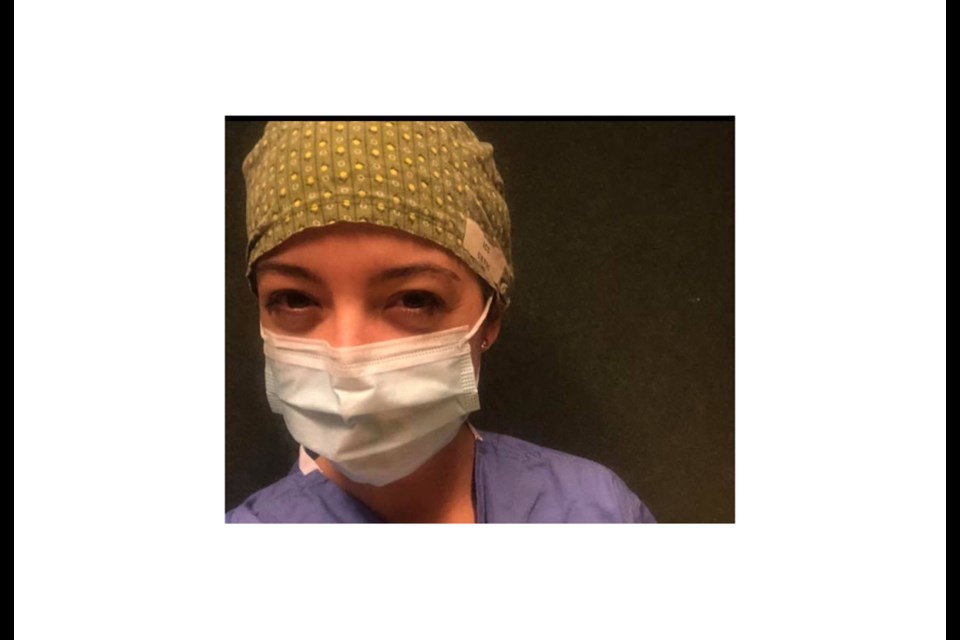Walking into the ICU at the peak of the COVID-19 pandemic for the first time, one local nurse said it was like going to another world.
Acute care nurse Chantelle Jimenez truly loves her patients and she wanted to do more for them.
She joined the University Hospital of Northern BC team in the ICU and infectious disease unit in December to care for those
“I needed to step up so I did,” Jimenez said who has lived here all her life and graduated two years ago.
“I remember stepping into the infectious disease unit for the very first time. You’re gowned up in this like space suit, it’s loud because there’s air continuously blowing at you so you don’t get COVID particles in your face. You step through this door that’s kind of a warm area and then you step through another door that’s almost like another world. There’s IVs beeping, there’s ventilators yelling at you saying your patient’s oxygen level isn’t great. You’re seeing row after row after row of patients with breathing tubes and it’s just so surreal. And then you take a breath to take it all in and then your patient’s oxygen drops or there’s a blood pressure you’re not liking or someone’s passing and you have to be there with them - so you just go.”
Jimenez did this for more than four months, day in, day out.
“I don’t want to say it gets easier but you get used to it,” Jimenez said. “And your coworkers are the greatest thing in the midst of the chaos.”
Following guidelines for those in the infectious disease unit, the staff didn’t see their family or friends.
“As a nurse and a profession you follow that guidance so you don’t see anybody - I guess it’s been almost a year now,” Jimenez said. “So your coworkers are the closest thing to family you have. You see the worst in people, you see the best in people, but your coworkers are always there and that gets you through the days.”
There are many people in the world that don’t understand how serious COVID-19 is. They don’t think it’s that bad, they don’t think it’s real, and they don’t think they could get it, she explained. There were patients in the hospital who denied having the disease right up until they were being intubated, she added.
The Citizen asked Jimenez to share one patient’s story.
“There’s one specifically that’s in my head,” Jimenez said.
“We were treating a patient for months within the ICU and infectious disease unit and it wasn’t going well. We were trying to keep her going but it got to the point where she wanted to say goodbye. You could kind of just tell the patient was tired. I remember taking the breathing tube out and putting an oxygen mask on her face, which in COVID times without the breathing tube is not the greatest. And I remember running down the hall with my coworker with her in the bed, gasping for air, so that we could meet up with her family who was gowned up and ready to say their goodbyes. I have never run so fast in the hospital but they needed that moment.”
She knows that in-person farewells didn't happen for a lot of families.
“That was a circumstance that we were able to make work but a lot of the times we were holding the iPad crying beside the patient while their family said goodbye as they took their last breath,” Jimenez said.
For Jimenez, there were rarely happy stories to recall because she didn’t work in the department where those occurred. That was in another part of the hospital where people were treated with some oxygen and then released. That was not what she experienced in the ICU and infectious disease unit.
The best Jimenez could do to recall a positive story was to talk about a patient who was able to breathe on their own for a time and was strong enough to sit in a chair by a window still using the breathing tube.
“They could look out and see their family and the drummers and it just gave a bit more hope and gave a little light at the end of the tunnel. That was one of the rare ones that I got to see.”
Jimenez's takeaway was the whole experience was a team effort.
“It was my nursing colleagues, the respiratory therapists, the physicians and the housekeepers, the physios, the lab technicians, the pharmacist, the drummers, the families - everyone just comes together to do what they have to do. We are so resilient as a profession and all the families are as well - incredibly resilient to deal with this. I can only imagine what they truly know of what their family member went through when they were with us. But they need to know that we tried to be there for every moment and be their advocators, educators and support system for when their family couldn’t be there.”
Jimenez is so happy to see the world is nearing the end of this pandemic.
“We’re so happy to see our friends and family get their vaccine - I cried when I got mine,” Jimenez said. “It’s so exciting to see just everything start to go away.”
She offered a simple message about the choice to be vaccinated.
“We’re tired, please help us.”



